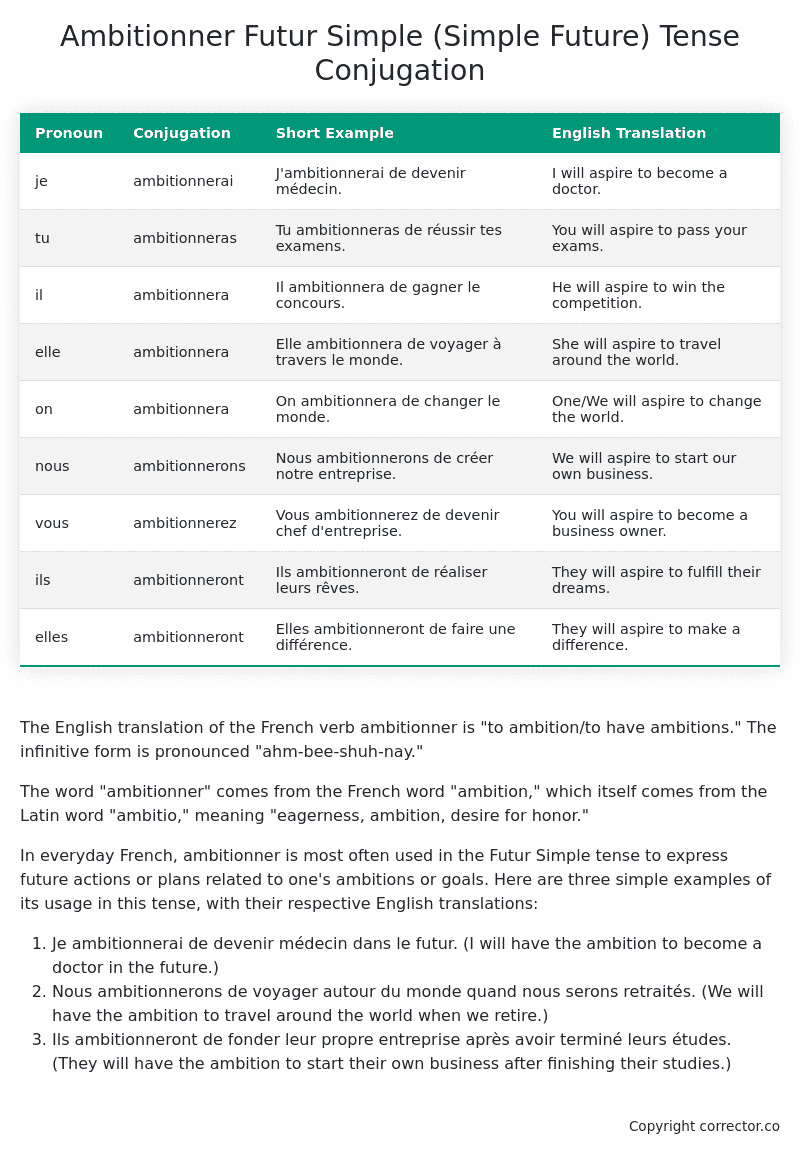Futur Simple (Simple Future) Tense Conjugation of the French Verb ambitionner
Introduction to the verb ambitionner
The English translation of the French verb ambitionner is “to ambition/to have ambitions.” The infinitive form is pronounced “ahm-bee-shuh-nay.”
The word “ambitionner” comes from the French word “ambition,” which itself comes from the Latin word “ambitio,” meaning “eagerness, ambition, desire for honor.”
In everyday French, ambitionner is most often used in the Futur Simple tense to express future actions or plans related to one’s ambitions or goals. Here are three simple examples of its usage in this tense, with their respective English translations:
- Je ambitionnerai de devenir médecin dans le futur. (I will have the ambition to become a doctor in the future.)
- Nous ambitionnerons de voyager autour du monde quand nous serons retraités. (We will have the ambition to travel around the world when we retire.)
- Ils ambitionneront de fonder leur propre entreprise après avoir terminé leurs études. (They will have the ambition to start their own business after finishing their studies.)
Table of the Futur Simple (Simple Future) Tense Conjugation of ambitionner
| Pronoun | Conjugation | Short Example | English Translation |
|---|---|---|---|
| je | ambitionnerai | J’ambitionnerai de devenir médecin. | I will aspire to become a doctor. |
| tu | ambitionneras | Tu ambitionneras de réussir tes examens. | You will aspire to pass your exams. |
| il | ambitionnera | Il ambitionnera de gagner le concours. | He will aspire to win the competition. |
| elle | ambitionnera | Elle ambitionnera de voyager à travers le monde. | She will aspire to travel around the world. |
| on | ambitionnera | On ambitionnera de changer le monde. | One/We will aspire to change the world. |
| nous | ambitionnerons | Nous ambitionnerons de créer notre entreprise. | We will aspire to start our own business. |
| vous | ambitionnerez | Vous ambitionnerez de devenir chef d’entreprise. | You will aspire to become a business owner. |
| ils | ambitionneront | Ils ambitionneront de réaliser leurs rêves. | They will aspire to fulfill their dreams. |
| elles | ambitionneront | Elles ambitionneront de faire une différence. | They will aspire to make a difference. |
Other Conjugations for Ambitionner.
Le Present (Present Tense) Conjugation of the French Verb ambitionner
Imparfait (Imperfect) Tense Conjugation of the French Verb ambitionner
Passé Simple (Simple Past) Tense Conjugation of the French Verb ambitionner
Passé Composé (Present Perfect) Tense Conjugation of the French Verb ambitionner
Futur Simple (Simple Future) Tense Conjugation of the French Verb ambitionner (this article)
Futur Proche (Near Future) Tense Conjugation of the French Verb ambitionner
Plus-que-parfait (Pluperfect) Tense Conjugation of the French Verb ambitionner
Passé Antérieur (Past Anterior) Tense Conjugation of the French Verb ambitionner
Futur Antérieur (Future Anterior) Tense Conjugation of the French Verb ambitionner
Subjonctif Présent (Subjunctive Present) Tense Conjugation of the French Verb ambitionner
Subjonctif Passé (Subjunctive Past) Tense Conjugation of the French Verb ambitionner
Subjonctif Imparfait (Subjunctive Imperfect) Tense Conjugation of the French Verb ambitionner
Conditionnel Présent (Conditional Present) Tense Conjugation of the French Verb ambitionner
Conditionnel Passé (Conditional Past) Tense Conjugation of the French Verb ambitionner
L’impératif Présent (Imperative Present) Tense Conjugation of the French Verb ambitionner
L’infinitif Présent (Infinitive Present) Tense Conjugation of the French Verb ambitionner
Struggling with French verbs or the language in general? Why not use our free French Grammar Checker – no registration required!
Get a FREE Download Study Sheet of this Conjugation 🔥
Simply right click the image below, click “save image” and get your free reference for the ambitionner Futur Simple tense conjugation!

Ambitionner – About the French Futur Simple (Simple Future) Tense
Formation of Futur Simple
For regular -er verbs (e.g., parler – to speak)
For regular -ir verbs (e.g., finir – to finish)
For regular -re verbs (e.g., vendre – to sell)
Common Everyday Usage Patterns
Conditional Statements
Interactions with Other Tenses
Futur Antérieur
Conditional
Present
Summary
I hope you enjoyed this article on the verb ambitionner. Still in a learning mood? Check out another TOTALLY random French verb conjugation!


